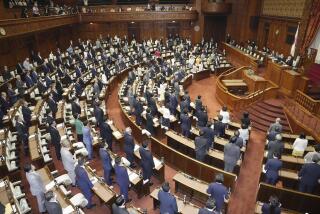Japan Gets Tangled Up as Tax Overhaul Takes Effect
- Share via
TOKYO — A sweeping overhaul of the tax system took effect Saturday, befuddling consumers and shopkeepers and increasing opposition leaders’ calls for the resignation of Japan’s already beleaguered prime minister.
The centerpiece of the reform is a 3% “consumption tax” on everything from taxi rides to apartment rents. At the same time, the reform cuts corporate, inheritance, higher-level income and residential taxes by $44.6 billion in fiscal 1989.
Part of those cuts will be offset by the sales tax, which the Finance Ministry has said will bring in $24.8 billion its first year.
It was Japan’s first major tax overhaul since World War II, and shoppers found themselves confronting long lines.
“Customers must wait longer at the register since we’re not used to calculating this tax yet,” said Tokiko Sekitake, a clerk at a Tokyo drugstore. “But they aren’t complaining. Most blame the government and sympathize with us.”
Dozens of city councils across Japan criticized the tax, and some have reportedly pledged not to implement it in certain sectors.
Opposition party leaders repeated calls for abolition of the tax and for Prime Minister Noboru Takeshita to resign. “Takeshita has said there will come a day when (people) will be glad the sales tax was implemented,” said Tsuruo Yamaguchi of the Socialist Party. “That is the lie of the century.”
Because of adjustments in a variety of taxes, the reform affected goods unevenly.
It lowered taxes on expensive imported liquor but increased the price of milk.
Prices of foreign luxury cars and domestic autos dropped, while taxi and subway fares increased.
The government granted a special exemption to small businesses, meaning two-thirds of Japanese enterprises won’t have to hand over the tax to the federal government. Small business and the agricultural sector are the mainstay of support for the governing Liberal Democratic Party.
Soon after taking office in 1987, Takeshita made tax reform a major goal. Last December, his party voted the package into law despite the first no-confidence motion by opposition parties in five years.
More to Read
Sign up for Essential California
The most important California stories and recommendations in your inbox every morning.
You may occasionally receive promotional content from the Los Angeles Times.













